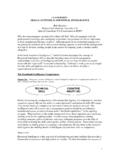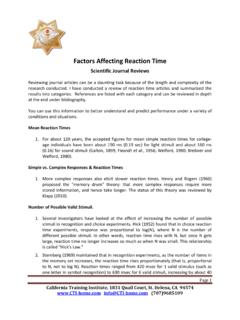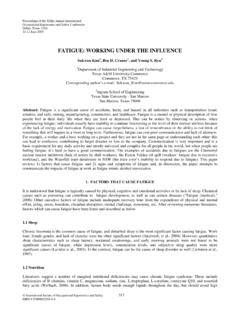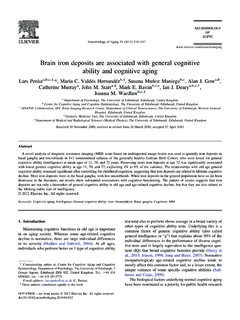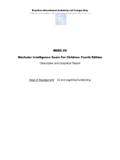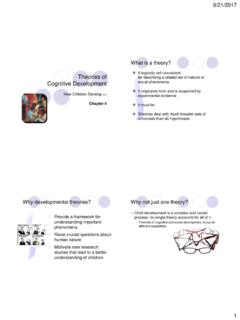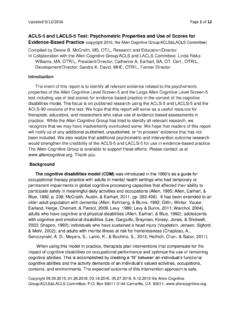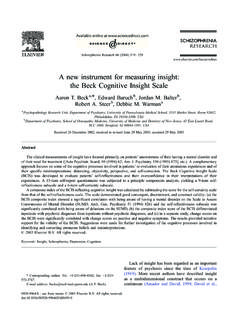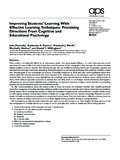Transcription of Cognitive Interview Method - California Training …
1 The Cognitive Interview Method of conducting police interviews: Eliciting extensive information and promoting Therapeutic Jurisprudence. Ronald P. Fisher R. Edward Geiselman Florida International University University of California , Los Angeles Abstract Police officers receive little or no Training to conduct interviews with cooperative witnesses, and as a result they conduct interviews poorly, eliciting less information than is available and providing little support to assist victims overcome psychological problems that may have arisen from the crime. We analyze the components of a typical police Interview that limit the amount of information witnesses communicate, and which militate against victims' overcoming psychological problems.
2 We then describe an alternative interviewing protocol, the Cognitive Interview , which enhances witness recollection and also likely contributes to victims' well being. The component elements of the Cognitive Interview are described, with emphasis on those elements that likely promote better witness recollection and also help to assist victims'. psychological health. The Cognitive Interview Method of conducting police interviews: Eliciting extensive information and promoting Therapeutic Jurisprudence. When a crime occurs, police take as their primary goals solving the crime and apprehending the criminal.
3 Police try to elicit as much information as possible from victims and witnesses, as their testimony is considered to be the best predictor of solving crimes (Berresheim & Weber, 2003;. George & Clifford, 1992; Kebbell & Milne, 1998; Kebbell & Wagstaff, 1997). Often overlooked, however, is the plight of the victim, who may suffer psychologically from having been victimized. Might the police, in a properly conducted investigation, also be able to assist the victim, in line with the tenets of Therapeutic Jurisprudence (Wexler & Winick, 1996)? We focus here on the role of the police Interview to accomplish these two goals: eliciting witness information to solve crimes, and promoting victims' psychological health.
4 Specifically, we examine a particular interviewing protocol, the Cognitive Interview (CI), as a Method to accomplish these goals. Ideally, witnesses and victims would observe the crime under optimal viewing conditions, possess good memories and verbal abilities, and be psychologically healthy after the crime. Unfortunately, these ideals often do not materialize as victims sometimes observe the crime under suboptimal viewing conditions, have poor memories and verbal skills, and are traumatized by their experiences,. Police have no control over these factors, however, and so they seem more like wishful thinking than effective police work.
5 About the only factor that police can control is how they Interview victims and witnesses. Our working hypothesis, and the focus of this article, is that the most realistic way to elicit high-quality witness information and facilitate victims'. health will come about by conducting effective interviews. What kind of Training do police receive to Interview witness and victims and how do they actually conduct these interviews? We were discouraged to find that police often receive only minimal, and sometimes no, formal Training to Interview cooperative witnesses, and, not surprisingly, their actual Interview practices are quite poor (see Fisher & Schreiber, 2007, for a review).
6 Throughout much of the world, police Training focuses on the many facets of police work other than interviewing cooperative witnesses, , learning the law, writing reports, testifying in court, driving safely, using firearms, controlling crowds, protecting evidence, etc. To the degree that police do receive Training on interviewing, it seems to be more on interrogating suspects (to elicit confessions) rather than on interviewing cooperative witnesses and victims. Although Training in interviewing cooperative witnesses is better in some parts of the world ( , UK, Sweden, Australia), for the most part, it is seen as a secondary, or more likely, tertiary, skill for effective police work (see , Allison, Sarangi, & Wright, in press, analysis of interviewing in India).
7 The lack of formal Training in interviewing cooperative witnesses and victims allows police investigators to conduct interviews based on their intuitions. In that sense, police interviewers are similar to other investigative interviewers who are also poorly trained, including accident investigator, attorneys, physicians, fire marshals, safety inspectors, etc. The prototypical interviews in all of these domains follow the same style of asking specific questions directed toward each fact that the interviewer needs to learn. The only difference across domains is in terms of content: Fire marshals ask specific questions related to combustion, physicians ask specific questions related to biochemistry and bodily functions, safety inspectors ask specific questions about safety equipment, etc.
8 So, for instance, the typical police Interview opens with a series of questions aimed at eliciting demographic information ( witness's name, address, telephone, time available). This is followed by a perfunctory open-ended question about What happened? Shortly after the witness begins to provide a narrative response usually on the order of a few seconds the interviewer interrupts and asks in a staccato fashion a barrage of short-answer questions: How old was the robber? Was he Black or White? How tall was he? Did he have a gun? How much money did he take? Interwoven among these questions may even be some leading or suggestive questions: Was he wearing a red shirt?
9 This line of specific, short- answer questions continues until the police investigator has exhausted the list of crime-relevant factors. Finally, the Interview terminates with the pro forma, Is there anything else? which invariably yields no new information (see Fisher, Geiselman, & Raymond, 1987, for a description of American police, and George & Clifford, 1992, for a similar description of British police). What are the consequences of this commonly used, evidence-driven style of interviewing? We examine this issue with respect to the two goals of investigative interviewing: eliciting extensive, accurate information and promoting victims' psychological health.
10 In short, the above style of interviewing accomplishes neither of the goals: It elicits less information than is available and it does not contribute to therapeutic jurisprudence if anything, it may harm victims'. psychological health. We examine why the typical police interviewing strategy is dysfunctional and then we describe an alternative Interview protocol that enhances the amount and quality of information gathered and also likely promotes victims' well being. First, let us describe the Interview itself, and then explore the implications for eliciting witness information and promoting Therapeutic Jurisprudence.
